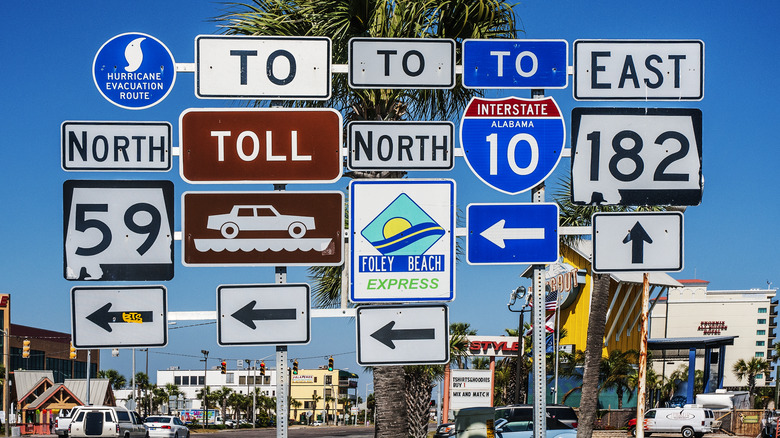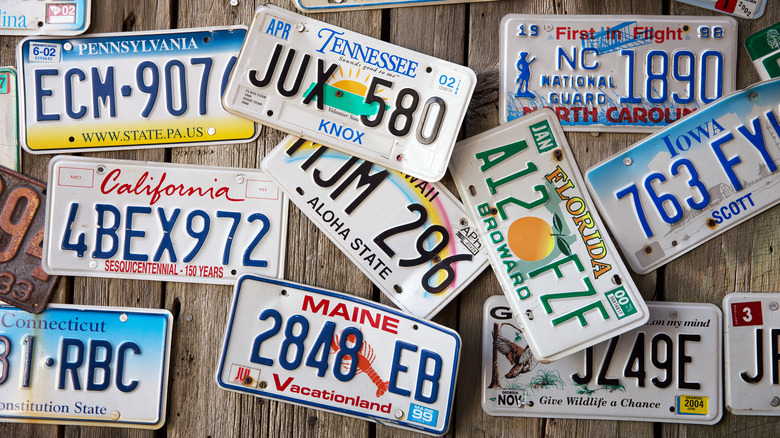The Most Entertaining Road Trip Games That Aren't Just For Kids
Rick Steves' top tip for road trips can help your journey begin with hope and promise. However, as most long drives go, passengers might become antsy, grouchy, and bored as the hours roll on. Sure, there are books and smartphones to keep everyone occupied, but chances are there won't be enough charging ports or signals for it to be totally reliable. But you also have your entire life to stare at your phone or read a book. This isn't a plane or train; you're in a private car with people you (hopefully) enjoy. And if you don't, there's no better way to change that than by engaging in a series of spirited games.
Car trip games are traditionally considered the domain of young children, even as part of critical essentials for road-tripping with toddlers. However, just like the best ice cream on the East Coast, unique theme parks, and kickball leagues, they work just as well for adults. Here are a few fun games that can make the hours fly by and make everyone leave the trip liking each other more than when it started, which doesn't always happen during road trips. Each requires minimal to no planning, materials, or even cell signal or battery: just a sharp mind and a quick sense of humor.
Two Truths and a Lie
Here are three statements about "Two Truths and a Lie," a popular road trip game and icebreaker. Two are true, and one is false. Try to guess the lie. 1. The only fundamental rule to this game is explained in its title: Every player must present two factual statements and one false, and other participants must try to guess which one is true. 2. There are championship leagues that play this game for money. 3. A good strategy for winning is to use truths that sound like falsehoods and lies that seem believable.
We probably wouldn't have won this round since we didn't follow the advice of Option 3, which is true. However, while we couldn't find evidence of official playing leagues, this is a competitive game with winners and losers, so nothing prevents you from playing for money. But we digress. As noted, the rules of the game are fairly simple, making this a versatile contest that can be played with kids, adults, and in big or small groups.
However, the strategy isn't so simple, making this a great game for adults, particularly ones looking to get to know each other better. For a shot at winning, as noted, choose simple lies that sound believable and truths that sound outlandish. Better yet, try to keep all statements at the same level of believability. Many players are inclined to save the lie for last, so try to mix up the order. And, of course, keep a good poker face throughout. Traditionally, the player who correctly guesses the lie will make statements next.
20 Questions
"20 Questions" is another classic game that's extraordinarily versatile. All you need to play are at least two people, though it can help to have a phone or pen and paper to keep track of the questions. One person thinks of anything in the world, from a Siberian tiger to Catherine the Great to Dubai's Burj Khalifa. Of course, what's being guessed should vary depending on who's participating. The most important factor is that it should be something that the other players will be able to guess using 20 yes-or-no questions or fewer, though not too easily.
Even though players win if no one can identify the subject matter, it doesn't count if they chose something that no one could've reasonably guessed, like the name of the person who sat next to them in 2nd grade. If you're playing with strangers, try areas of common knowledge, like celebrities, animals, travel destinations, or foods. If you're playing with close friends or family, you'll need to get much more specific to stump them. On a road trip, it can be especially fun to narrow down the category to people, places, and things experienced on that trip.
Players can only ask questions with a "yes" or "no" answer. It would be much easier to ask questions like, "What's his name?" or "What color is it?" as opposed to, "Is it Chris from next door?" or "Is it blue?" The first questions should be broad, like, "Is it someone I've met?", "Is it a woman?" or "Are there more than one of it?" Based on the replies, questions should grow increasingly specific so that by the 20th question, the answer is clear.
Alphabet Road Signs
As the hours roll on, road trips can become tedious, particularly if you're driving on a long stretch of an uninspiring highway. But a classic old game will suddenly make an ExtraMile convenience store, or a billboard advertising insurance quotes the most exciting part of the trip. The "Alphabet Road Signs" game is fairly simple: Players try to find every letter of the alphabet, whether in road signs, billboards, storefronts, or license plates. Some purists limit choices to letters found in road signs, while others count letters found anywhere, especially as they grow increasingly desperate for rare letters like X or Z.
If you play with points, the player who spots the most letters wins. However, players could spot the same letter at the same time, or the letter could whiz by so quickly that it's hard to verify. So, often, just catching all 26 letters is victory enough, and the honor system is in effect.
The most common variation is to simply look for the letters. However, if you'd like to add a new challenge, you can try to find something that begins with each letter of the alphabet and pray to find a discarded xylophone or x-ray machine along the side of the interstate. If you're feeling extra spicy or bored, take a page out of a book or article and find as many of its words as possible along the road.
Celebrity Name Game
Even if you're driving in a desolate expanse with nary a road sign to be seen, you can still enjoy some alphabet fun. To play the "Celebrity Name Game," one person thinks of the name of a celebrity. The next person thinks of another celebrity whose first name starts with the same letter as the prior celebrity's last name. For example, if you start with Taylor Swift, the second person could say Sean Connery, who could be followed by Cameron Diaz, and so forth. If someone names a celebrity with the same first and last initials, the order of players traditionally reverses. If you're playing with more than one person, that means that the order changes from clockwise to counterclockwise, for example.
Anyone who misses their turn or gives an incorrect name is out. If the volley is going a little too smoothly, you can complicate things by narrowing down the type of celebrity acceptable to name. For example, players can only name male stars, actors in Harry Potter, rappers, tennis players, etc. If you have a spare pad of sticky notes available, you can also try your hand at "Celebrity," in which everyone is assigned a particular celebrity whose name is written on a Post-It attached to their forehead. Everyone tries to guess their identity by asking 20 Questions-style queries.
Fortunately, Unfortunately
Once upon a time, a few friends decided to go on a long road trip. Fortunately, they had podcasts, audiobooks, and music to keep them occupied. Unfortunately, as soon as they got to a long stretch of total wilderness, they lost all signal, and the car's charging port stopped working. Fortunately, they had the game "Fortunately, Unfortunately" to entertain themselves. Unfortunately, without access to maps, they had no idea where they were going. Fortunately, they were having so much fun playing "Fortunately, Unfortunately," they didn't care!
The game "Fortunately, Unfortunately," is as simple as the paragraph above. One person begins with "Once upon a time," and the next person follows with something "fortunate," whatever that may mean to them. The next person follows with an "unfortunate" plot twist, and the story continues to meander, in many ways, imitating the way a life ruled by mercurial fates can feel. The game has no real end, winners, or losers, but is an engaging and humorous way to whittle away the hours. A similar variant is called "One-Word Story," in which each person contributes a single word until a coherent narrative is accomplished. Well, "coherent" is usually a stretch, but it will surely be entertaining.
Ghost
Most word games, in some way, share the goal of completing words, but in "Ghost," the goal is to avoid completing a full word. One player begins by mentioning a letter. The second player contributes another letter, ideally one that is part of a word consisting of four or more letters, so they'll not be left to complete the spelling after it cycles back to them. To stall, some players may be tempted to name a ridiculous letter that won't lead anywhere, but if one player suspects that another is bluffing, they can challenge them. If the challenged player can name a valid word they were thinking of, the challenger gets a punitive letter of the word "Ghost." If the challenged player cannot, they get a letter.
Anyone who says the last letter of a word gets a letter of "Ghost." The game continues until the word "Ghost" is spelled out, and the person with the most letters loses. To avoid a word landing on you, study up on your suffixes — add-ons like "ing," "ness," and "able" will suddenly become your best friends unless, of course, they loop right back to you.
Different versions of "Ghost" allow players to place letters in different parts of the existing word. For example, if the letters "AND" have already been named (though "and" is a word, it does not count in this game because it has less than four letters,") a player could place their letter anywhere in this word, not just after "D."
Going on a Picnic
This game will likely resonate with a group of people who have just spent lots of time preparing for a road trip, which involves endless decisions about what's necessary and possible to drag along. In "Going on a Picnic" — which you could rename "Going on a Road Trip" just to be cute — one player comes up with an arbitrary rule about the items that can and can't be brought along. When played with children, the rule is often simple — only items that begin with the letter "M," or items that are green. With adults, the sky's the limit.
You could only allow items that are both green and start with "M," start with the first letter of the person guessing the item, only have two syllables, have exactly seven letters, have names with a Latin root, were only invented after the year 2000, or are only legal for people 18 and older, to name just a few random examples. The goal is to prevent other players from guessing, so the more complicated, the better.
The player who invented the rule starts by saying, "I'm going on a picnic, and I'm bringing eggs, so I can go." The next person tries to guess by saying, "I'm going on a picnic and I'm bringing carrots, so I can go?" Depending on whatever the rule was, the original player tells them if this is an acceptable item or not. The game continues until someone guesses. Another variation of the game called "Green Glass Door" stipulates that all players state not only what they're bringing but what they're not.
I Spy
Some of the best road trip games don't just distract. Instead, they help travelers pay closer attention to the exciting new scenery unfolding before their eyes. And even if it isn't so exciting, the magic of games is that they can turn the mundane exciting. One of the best examples of this is "I Spy," a classic game in which everyone tries to guess something the other person has seen. The spy utters the iconic phrase: "I spy, with my little eye, something..." The person who guesses first gets to be the next spy.
In a fast-moving car, objects can disappear quickly, so it's best to choose something far in the distance. Alternatively, you could play "I Spy" lightning round, where the game moves extra fast, and everyone tries to spot the object before it fades into the distance. You can also play with objects inside the car, which becomes packed with more and more fascinating items the longer the road trip continues.
One enterprising website created an I Spy Scavenger Hunt list that includes almost every road trip staple one can imagine, from a bearded motorist to a "baby on board" sign to a hubcap on the side of the road. Print this long list out, and give a prize to the person with the most checkmarks. The most pared-down version of the I Spy Scavenger Hunt is the famous Punch Buggy game. The goal of the game is to spot the most "punch buggies," officially known as the Volkswagen Beetle. As soon as you see one, shout "Punch Buggy no punchbacks" within a few seconds, or risk getting punched. A standard Beetle from recent years is worth one point, classic bugs are worth two, and vans are worth five.
License Plate Game
The "License Plate Game" is a classic road trip game that's like "I Spy" for geography nerds. The rules are pretty straightforward, and we imagine many people probably come up with this game on their own without even knowing that it's a recognized game included on almost every standard list of road trip games. The goal of the game is to spot license plates from all 50 U.S. states on the road. To broaden your scope, you can try adding in Canadian provinces and Mexican states as well. If you're road tripping in Europe, try to spot a plate from each country, though this is tougher than in North America since the only thing that distinguishes country license plates are tiny letters in the corner.
License plates from the state you're currently in don't count as a point, though they should be recorded in the final list. The person who spots the most states wins. If two players spot the state at the same time, the first person to call it gets the point. We just invented the following rule out of nowhere, but we think it's reasonable to declare any mainland spotting of a Hawaiian license plate as an automatic win.
You may get bored after seeing the same few states over and over again, as tends to happen. To liven things up, you can combine this game with the "Alphabet Road Sign Game" and "I Spy." If you spot a rare, classic Volkswagen Beetle from Hawaii, you don't have to pay for anything for the rest of the trip; we've also just decided.
Radio DJ
It's not a true road trip if the radio isn't blasting everyone's favorite songs at top volume. Just listening to great music with friends and family is entertainment enough, but competition always adds a little bit of extra seasoning. To play "Radio DJ," either flip through radio stations (a nice way to get a sense of the local culture) or put someone's playlist on shuffle.
Each time a new song comes on, the challenge is twofold: First, the person to name the song gets a point; anyone who peeks, Googles, or Shazams loses all points and has to walk the rest of the way (If it's safe and you're close to your destination. Or, you could decide a punishment). If they can name the artist, they get another point. Second, try to sing along, karaoke-style. The person who can sing the most lyrics gets another point. If no one knows the song, you can keep listening or move on to something that someone would know.
If the radio gets scratchy or your phone dies, you can try the acapella "Singing Game." One person starts by singing a song. When a certain lyric reminds a participant of another song, they can join in. For example, Beyoncé's "Got me lookin' so crazy right now, your love's got me lookin' so crazy right now," could lead to Gnarls Barkley's "Does that make me crazy, does that make me crazy?" Everyone can sing along the best they can.
While You Were Sleeping
After belting your lungs out and keeping an eagle eye on letters and license plates, someone is bound to partake in another classic road trip pastime: sleeping. After this person's been asleep for more than five minutes, everyone else springs into action, creating a made-up story about something that supposedly happened while they were asleep. The key is for the story to be surprising yet still believable. You can tell them that they were unknowingly professing their love for a passenger, that a bird flew right into the windshield, you just bribed your way out of a speeding ticket, or that you got a flat tire and Nicolas Cage pulled over to help you fix it. We're spitballing here, but you get the idea.
As soon as the person wakes up, everyone takes turns recounting the fake story. Anyone who breaks character loses a point. If the person believes the story, everyone who told it gets three points. If the person pretends to believe the story and somehow proves they knew it was fake all along, they steal everyone's points and get to be both a winner and well-rested.











